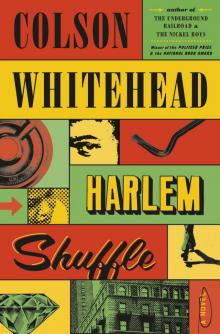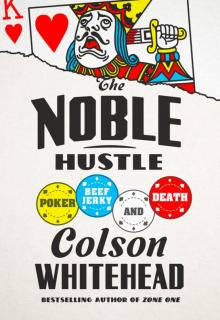- Home
- Colson Whitehead
The Intuitionist Page 24
The Intuitionist Read online
Page 24
Catastrophic accidents are a-million-in-a-million occurrences, not so much what happens very seldom but what happens when you subtract what happens all the time. They are, historically, good or bad omens, depending on the time and place, urging in reform, a quest for universal standards of elevator maintenance, or instructing the dull and plodding citizens of modernity that there is a power beyond rationality. That the devil still walks the earth and architecture is no substitute for prayer, for cracked knees and desperate barter with the gods.
She does not hear the car horn, let alone the urgency of the car horn. She drifts into the right lane and almost sideswipes the mock wood paneling of the station wagon. The kids in the backseat scream, pink lungs heaving, father’s hands grip the steering wheel, but for all the commotion of this few seconds there is no accident. Lila Mae’s automobile and the family’s automobile do not crash. She decelerates and eases into the shoulder of the highway, gravel popping on the undercarriage. Rests her head on the green rubber of the steering wheel.
Arbo and Natchez are merely unanswered questions. Their intrusion into her life is a matter of cause and effect, prospering along logical trajectories of greed, and only require adequate information to explain them. Time to sift the facts through her fingers and shake out the fine silt until what is left in her hand is what happened. But there is still this matter of Fulton and Intuitionism. She thinks, what passing for white does not account for: the person who knows your secret skin, the one you encounter at that unexpected time on that quite ordinary street. What Intuitionism does not account for: the catastrophic accident the elevator encounters at that unexpected moment on that quite ordinary ascent, the one who will reveal the device for what it truly is. The colored man passing for white and the innocent elevator must rely on luck, the convenience of empty streets and strangers who know nothing, dread the chance encounter with the one who knows who they are. The one who knows their weakness.
She believes the documentary evidence Natchez showed her, even if his blood tie to Fulton has been exposed as a lie. (Back on the highway now: she hadn’t pulled over to ponder the accident that didn’t happen but the one that did, ten days before.) Fulton was colored. In his books, the hatred of the corrupt order of this world, the keen longing for the next one, its next rules. He was the perfect liar the world made him, mouthing a supreme fiction the world accepted as truth. (Back on the highway, going where she’s going.) In constant fear of that shadow, the shadow of the catastrophic accident that would reveal him for what he was. The shadow that envelopes and makes him dark.
Almost there, Lila Mae.
The black gates of the Institute for Vertical Transport are open. On Sunday, the students depart campus to attend mass at the neighborhood churches. The churches of this town welcome all fellow believers, no matter where they were born, what circumstances and choices have led them here. She drives around the east side of campus, duly noting the squat edifice of Fulton Hall, the Engineering Building, even her old home, the Gymnasium, always quiet on a Sunday morning. Trees cluster respectfully at the side of the road as she approaches the declivity that marks the faculty housing. She parks. She closes the door of the sedan. It only takes a minute for Mrs. Rogers to answer her knock. Lila Mae says to the old woman, “He was joking, right? About Intuitionism. It was all a big joke.”
* * *
Sometimes when the wind drove the rain beneath the roof of the porch, when the wind was particularly upset at something or other, the rain would hit the front edge of the couch and wet it. That’s why the old brown couch always smelled so sour: old damp and mold. They never lifted it into the back of the truck and doomed it to the rotting piles at the town dump. It was an old couch and treasured for the solid parity it had achieved between its comforts and defects, so the Watson family kept it on the porch. One example of its magic: the porch paint did not peel if it was underneath the couch. And another: the right side had formed a perfect bucket for Marvin Watson’s behind, widening over the years, incredibly, as Marvin’s behind widened. Marvin sat in his groove that day and tapped the envelope against his thigh. He told his daughter when his waiting ceased, when she cracked down on the first steps of the porch, “Your mother went to the store. She gave me this.”
Lila Mae had hoped to intercept the letter at the mailbox and have time to read the words and consider them for a few days before she would tell or not tell her parents. Her schedule at Mrs. Applebaum’s made it impossible. She never knew when she was going to get out. She had considered bribing Mr. Granger, the mailman who served colored town, but had decided it too complicated. She saw the red crest of the Institute for Vertical Transport, which she had seen first a few months before in the town library, and saw the soft shark teeth where her mother had opened the letter, probably with one of the Watson household’s many dull knives. As her father extended the envelope to her he said, “You didn’t tell me you had applied.” The envelope was good paper. The thick, elegant paper they have up there. No broken mills, cheap mills, there. She withdrew the letter, it was still light enough to read without getting a headache. Her father watched her eyes. He wore his house clothes, the coarse trousers and heavy shirt he wore on the weekdays, before and after work. When he was out of the Huntley’s uniform. The house clothes changed. They were replaced every few years by new versions in different colors. The Huntley’s uniform, however, remained the same. Lila Mae saw it once. He snuck it out of work one day to show Lila Mae and her mother. Colored people were not allowed into Huntley’s if they wanted to buy things. Only if they worked there. She read the letter and replaced it in the envelope.
Her father asked, “What are you going to tell Mrs. Applebaum?”
“I told her I might be leaving to go to school. I told her that when I started.”
“You didn’t tell us,” her father answered. Then he said, “There’s no shortage of people who could take your place with Mrs. Applebaum.”
She had decided when she saw him on the couch. When she knew he knew. Lila Mae said, “I hate to leave you and Ma all by yourselves.”
Her father leaned back, to a verse of metal growling from inside the couch. He said, “You don’t worry about us. You worry about yourself. It’s not so different up there, Lila Mae. They have the same white people up there they got down here. It might look different. It might feel different. But it’s the same.”
* * *
He lived here, assembled his vehicular epiphanies here, mulled over the bolts and pins of his mythology in this very house. Mrs. Rogers leaves her in the ruined parlor. Beneath her, an angry slash of ripped upholstery grins ticking. The fireplace mantle has been swept clean—she can see the coat sleeves of the men who trashed her own apartment brush across it—and her host’s collection of ceramic horses are dashed to the floor, broken heads and limbs. The men’s fingers groped inside the couch and chairs after Fulton’s notebooks and Mrs. Rogers’s loose change, smashed the two emerald lamps to see what may or may not have been inside them, cracked the frame of Fulton’s portrait over taut knees. Lila Mae rubs her hands on her thighs and surveys the damage. The odor of cigar smoke lingers in the dull air and she can see a cigar butt ground into a photograph of Mrs. Rogers and her children, in happier times, not here. They didn’t find anything but must persist, a determined gang thundering through the houses of those who might possess the object. Their violent blundering seems so pathetic to Lila Mae now, a child’s plea for attention, a good hug. They’ll never find it.
Mrs. Rogers returns from the kitchen with tea and thin butter cookies. Lila Mae reads the old grooves in her skin, the ripples around her eyes and mouth, the after-images of old expressions. The human face is only capable of two or three real expressions, and they leave their mark. Lila Mae thinks, she only has one expression and what will her face look like forty years from now. Eroded rock, a wall of dry canyon. Mrs. Rogers sighs, “They gave this place a real going over. Just a fine mess they made. Broke all of my horses. Broke they legs off.” She doesn�
��t look at the mess on the floor, busying herself with the delicate disrobing of a sugar cube. “I was in the city visiting my sister and I come home to this.”
“Last night?” Lila Mae asks. “What time did you get back?”
“About eleven last night.”
Then they hit the place right after she left Ben Urich. When they realized she knew. Lila Mae’s been a practicing solipsist since before she could walk, and the days’ recent events are doing irreparable damage to her condition.
Mrs. Rogers points to a bucket in the corner. A gray dishrag slithers over its lip. Preoccupied, she says, “One of them relieved himself on the floor. You can’t smell it, can you?”
“I don’t smell a thing,” Lila Mae lies. “Did you call the police? Institute security?”
“What for? They probably the ones that did it.”
Lila Mae leans forward in her chair. “This is the first time, right? When you told the Institute that this place had been broken into after Fulton’s death and his notebooks stolen, you made that up, correct?”
“It may have been a lie,” Mrs. Rogers shrugs. Stands. She hasn’t touched her tea and snacks. It’s all ritual, Lila Mae appraises. Her host says, “I did most of the upstairs, but I haven’t finished down here. Do you want to give me a hand?” An old house and an old woman. She needs to preserve the rules of this place, the order she keeps beneath the pitched roof. Even though they have pissed on it. She bends over slowly before the fireplace and picks up one of her fallen horses. It kneels on its stomach in her rough palm. No legs. Mrs. Rogers gets down on the floor and looks for its legs.
Lila Mae grabs the broom that leans against the back of her chair. She picks an area, sweeps couch innards and shredded paper into mounds. The old woman says, “To answer your question, yes, he was having a joke on them at first, but it wasn’t a joke at the end. It became true.” She discovers one of the tiny thoroughbred’s legs under the newspaper rack and holds it up to the window. “You have to realize something about James,” continuing, tilting the leg in the sunlight. “Deep down he was real country. No kind of sense at all in his head except his own kind of sense. That’s what made him what he was.”
After all that has happened, Lila Mae figures she can put up with the woman’s drifting explanations. There’s no rush. Lila Mae says, “But he wasn’t who he was. He passed for white. He was colored.”
“Well look at you,” Mrs. Rogers says with exhaustion, sparing a second for a quick glance at her visitor. “Not the same girl who was knocking on my door last week, are you? With your chest all puffed out like a peacock. You’ve seen something between now and then, huh?” She places the horse on the mantle, where it rolls over on its side and exposes its white belly and manufacturer’s lot number. “I didn’t even know myself until his sister come up to visit one time, and I lived under the same roof with the man. I knew he wasn’t like no other white man I had worked for, but I didn’t think … She came up to the door one night—I don’t know, fifteen years ago? Twenty? Whenever it was, it was right before he wrote the second one of his Intuitionist books.”
This information isn’t hard to recall for Lila Mae. There was an eight-month break between the publication of Theoretical Elevators Volume One and Fulton’s embarkation on Volume Two. It was twenty years ago when Fulton’s sister knocked on his door. What did she look like. What do you say to a brother you have not seen for decades. Lila Mae can barely speak to people she saw last week.
“She shows up at the door,” Mrs. Rogers continues, “and tells me she has to see James. She was one of them down-home women. You could see she made herself the clothes she got on her back. I look her up and down because I don’t know who this woman is, and say I got to see if Mr. Fulton is receiving visitors. You should have seen his face when he walked down the stairs. His pipe fell right out of his mouth onto the floor—you can still see the carpet where he burned it. He starts fussing and telling me to go out to the store—suddenly he got to have fish for dinner. So I leave, and when I get back, she’s gone and James is sitting in his study reading his journals like nothing’s strange. Asks me what time will dinner be ready, just like that. He told me who she was later, but that was after.”
Did she bring photographs or bad news: the death of their mother. Money for burial costs. What do you say to your brother who you have not seen for many years. She can see them talking in this room. The furniture is the same, the day’s light thin and cold. He sits in the chair Lila Mae sat in, hands kneading the armrests. It is the moment he has feared since he left his town. When he will be revealed for who he is, the catastrophic accident. But his sister does not expose him. She did not make him crash. He was saved.
“It wasn’t soon after that he started acting funny,” Mrs. Rogers says. She has now retrieved four horses and eleven legs. They lay on the mantle as if on a battlefield. Their masters dead and dying. “Just little things a body wouldn’t notice at first, but then it creeped up on you.”
“Like when he dunked the provost’s head in the punch bowl at the groundbreaking ceremony.”
“That was later, but you on the right track,” Mrs. Rogers tells her. “He’d been in a pretty good mood because his first Intuitionist book was doing alright. It had been hard on him but now he was getting what he deserved. When he finished that first book he showed it to them up on the hill there. His colleagues. And they just tossed him out of there—he couldn’t get anyone to take it seriously. None of them wanted to touch it. So he paid for it himself, and it started. They believed it.”
She can’t decide which porcelain limb belongs to which porcelain horse. “I remember when the first reviews came out in one of those elevator journals,” she says, placing the leg next to a small white pony caught in fractured gallop. “He sits down right in the chair right there and starts reading it. I was in the kitchen cooking. I didn’t hear anything for a long time, and then I hear him laughing. You see, James was a very serious man. He had a sense of humor, but it was his own sense of humor. We lived in the same house for years and I don’t think there was one time when we both laughed at the same thing. That day I hear him laughing from the kitchen. Like I ain’t never heard him laugh before—like it was the biggest, best joke he ever heard. I come running out and ask him what’s so funny. And he just looks up at me and says, ‘They believe it.’ ”
She must be referring to Robert Manley’s famous mash note in Continental Elevator Review, which, if Lila Mae’s memory serves, anointed Fulton “the field’s greatest visionary since Otis” and “hope’s last chance against modernity’s relentless death march.” It was the first review to describe Fulton’s approach as “Intuitionist”: postrational, innate. Human. No wonder he laughed. His prank had succeeded. From that review’s cornices, the gargoyle of his mythology shook its stiff, mottled wings and conquered, city by city, whispering heresy, defecating on the robust edifices of the old order. No wonder he laughed.
Mrs. Rogers pulls Lila Mae back from distraction. Mrs. Rogers says, “I never seen him happy like that. He was happy for a whole week, and that’s the longest time I ever seen him happy. Then one night I’m down here doing my crosswords. I couldn’t sleep so I was doing my puzzles. James comes down from up there, wearing his robe—I thought he was in bed. He comes downstairs looking confused and upset and he says to me, ‘But it’s a joke. They don’t get the joke.’ ”
“He thought that someone would understand but they didn’t.”
She nods. “They had all their rules and regulations. They had all this long list of things to check in elevators and what made an elevator work and all, and he’d come to hate that. He told me—these are his words—‘They were all slaves to what they could see.’ But there was a truth behind that they couldn’t see for the life of them.”
“They looked at the skin of things,” Lila Mae offers. They couldn’t see his lie. It was Pompey that allowed her to see Fulton’s prank. The accident resounds in her still, the final notes of the crash the new background m
usic of her mind. She had been so sure that Pompey had sabotaged Number Eleven—it appeased her sense of order. If Chancre wanted to set her up, any number in her Department would have been happy to oblige. But Lila Mae fixated on Pompey. The Uncle Tom, the grinning nigger, the house nigger who is to blame for her debased place in this world. Pompey gave them a blueprint for colored folk. How they acted. How they pleased white folks. How eager they would be for a piece of the dream that they would do anything for massa. She hated her place in their world, where she fell in their order of things, and blamed Pompey, her shucking shadow in the office. She could not see him anymore than anyone else in the office saw him.
Her hatred. Fulton’s hatred of himself and his lie of whiteness. White people’s reality is built on what things appear to be—that’s the business of Empiricism. They judge them on how they appear when held up to the light, the wear on the carriage buckle, the stress fractures in the motor casing. His skin. Picture this: Fulton, the Great Reformer, the steady man at the helm of the Department of Elevator Inspectors, gives up his chair when the elevator companies try to buy his favor, place him in their advertisements. They have already bought off many of the street men—building owners lay cash on inspectors in exchange for fastidious blindness to defect. Their sacred Empiricism has no meaning when it can be bought. When they can’t even see that this man is colored because he says he is not. Or doesn’t even say it. They see his skin and see a white man. Retreat behind the stone walls of the Institute does not change matters. He is still not colored. There is another world beyond this one. He was trying to tell them and they wouldn’t hear it. Don’t believe your eyes.
Mrs. Rogers says, “He was making a joke of their entire way of life and they couldn’t see. The joke wasn’t funny to him anymore. Once he realized that—that it was a joke but they didn’t see it like that, it wasn’t a joke anymore. His sister come to visit soon after that. He told me later she saw him in the newspaper. Like I said, he got strange after that. He started writing that second book. He’d lock himself in his study and he wouldn’t come out. I had to start leaving his dinner outside the door because he wouldn’t come down to eat. This went on for months and months. Then one day he comes down and says he finished.”

 The Nickel Boys
The Nickel Boys Zone One
Zone One The Underground Railroad
The Underground Railroad The Colossus of New York
The Colossus of New York The Intuitionist
The Intuitionist Apex Hides the Hurt
Apex Hides the Hurt Harlem Shuffle
Harlem Shuffle The Noble Hustle
The Noble Hustle